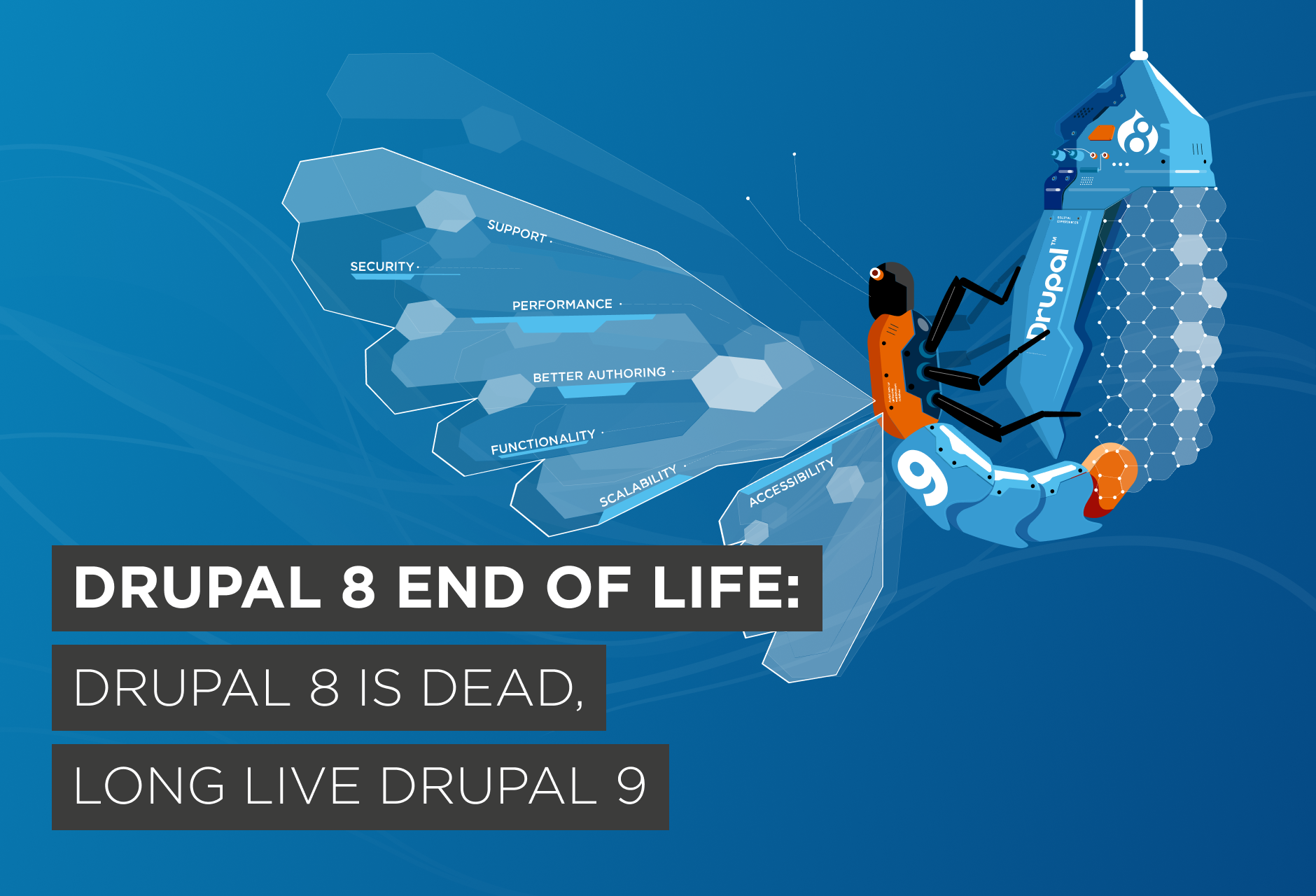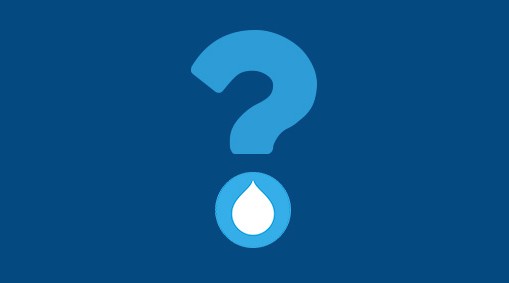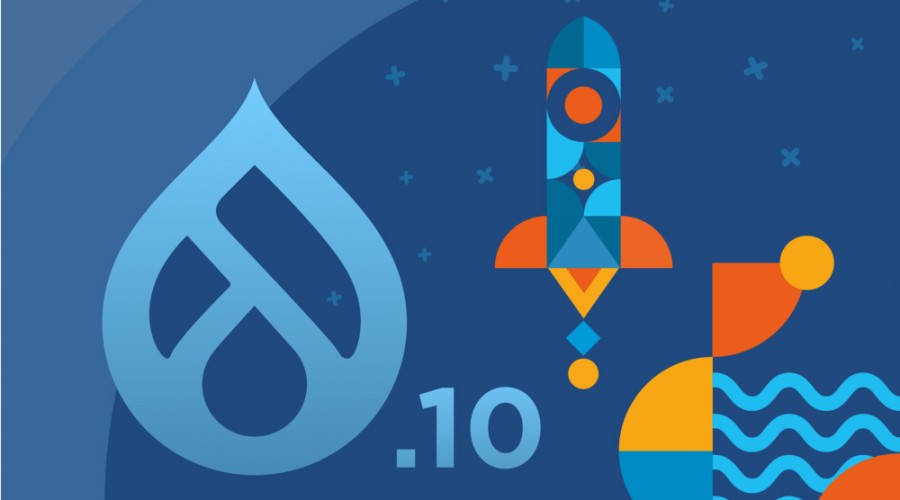Drupal 8 has been one of Drupal's most popular versions, but as of 2nd November 2021, it has now reached its end of life. This article aims to answer questions about Drupal 8 end of life and upgrading to Drupal 9.
NOTE: In June 2023, it was announced that the end-of-life (EOL) for Drupal 7 is being pushed back to January 2025. Read more here.
What is end of life (EOL)?
In terms of software, EOL refers to the date core developers stop making changes to that version of the software and remove active support for any issues identified. In practical terms, this means that the developers will no longer offer support, updates, or patches to that version of their software.
When is Drupal 8 end of life and what does that mean?
This means that there will be no more improvements to Drupal 8 core beyond 2nd November 2021 and all the development efforts will move to Drupal 9 and 10. The Drupal security team will stop looking for security flaws in Drupal 8 core and contributed modules and working to fix them. Because Drupal is open-source, some of the maintainers of contributed Drupal 8 modules may carry on supporting them after Drupal 8’s EOL. However, they too will be keen to move on to the latest version. When Drupal 6 reached its end of life, several vendors carried on supporting the core software because it was commercially viable for them to do so. This is highly unlikely with Drupal 8. We’ll discuss why.
Product EOLs are important. They push those products to constantly improve and allow developers to benefit from the latest UX and design methodologies, improve underlying security, enhance performance, and add new functionality.

Drupal 8 has reached the end of the road.
Why did Drupal decide to end support for Drupal 8?
Some people might wonder: why Drupal 8 if Drupal 7 hasn’t reached EOL? For Drupal 8, the core maintainers decided to use a number of very mature and powerful 3rd party open-source components to do a lot of the heavy lifting so that the Drupal community could concentrate on making Drupal 8 formidable.
Drupal 8 is dependent on the Symfony 3 framework. Because Symfony 3 is approaching its own EOL, Drupal needed to be updated to work with Symfony 4 and that’s the main difference between Drupal 8 and 9. Because Drupal 8 has these external dependencies over which it has little control, it needs to fall into a similar EOL cadence as those dependencies. Symfony 3 is EOL in November 2021, therefore Drupal 8 end of life needs to be at the same time.
Drupal 7 on the other hand does not have these dependencies, so it is not tied to the lifecycle of those components. It was originally intended to be EOL at the same time as Drupal 8. However, due to the pandemic and a huge number of sites still stuck on Drupal 7, they decided to give Drupal 7 another year.
What are the risks of staying on Drupal 8 after its EOL?
The most significant way in which Drupal users will be affected is that they will no longer receive bug fixes and security updates after November 2021. In other words, there won’t be any patches or extended support from the Drupal security team. Your website may also become vulnerable to attack by hackers. As hosting providers update their platforms you may also find that your website simply stops working.
Can I stay on Drupal 8?
Long-term support (LTS) has been provided to Drupal 6 by commercial vendors, and while Drupal 7 may also receive this long-term support, LTS will not happen for Drupal 8. Therefore, it’s vital to upgrade Drupal 8 to 9.
Why will LTS not happen for Drupal 8?
Firstly, migrating your Drupal 8 site to Drupal 9 is relatively easy so the demand for LTS will be low. Secondly, due to those dependencies, any LTS provider will not only have to create and support their own version of Drupal 8, but also their own version of Symfony 3 and all the other dependencies that Drupal 8 relied on that are no longer supported by their creators. That’s a lot of expertise they’ll need. It simply won’t be economically viable to offer Drupal 8 LTS.
Upgrading Drupal 8 to 9
Drupal 9 was released in June 2020, with Drupal 9.1 launched in December 2020 and further minor releases every 6 months after that.
The release of Drupal 9 was based on the last version of Drupal 8, and therefore the upgrade to Drupal 9 is fairly straightforward. In fact, according to Dries Buytaert, Drupal’s founder, it took only one month to go from 0 to 60k websites on Drupal 9, compared to 7 months on Drupal 7 and 3 months on Drupal 8.
As Drupal 9 is an enhancement of Drupal 8, there is no difference in the “look and feel” of Drupal 9. The main difference is in the underlying tech stack and the additional features with each minor version release (9.1, 9.2, etc.).
In the meantime, Drupal will start rolling out Drupal 10 in June 2022, with August and December as fallback dates. Drupal 10 will be a refined version of Drupal 9, offering much of the same Drupal core functionality, tools, and processes, and users will have to be Drupal 9 users in order to do the major version upgrade to Drupal 10.

We have moved Sport England's website from Drupal 8 to Drupal 9.
Making sure your site stays up to date
No matter what version of Drupal you use, users should always be proactive in protecting their websites. In the case of Drupal 8 end of life, time is obviously of the essence, as we don’t recommend that commercial organisations rely on unsupported software.
Time is less of a concern to Drupal 7 users though, with Drupal 7’s EOL set for November 2022. But because this migration is much more complex, those users might want to start evaluating now how they use their website in order to correctly plan and execute their upgrade to Drupal 9.
From a technical point of view, the upgrade from Drupal 8 to 9 is not difficult. It requires no content migration and most of the work involves patching contributed modules and minor updates to any custom modules created for your website. And while businesses with experienced Drupal developers can follow Drupal’s upgrade documentation, others might want to consider partnering with a Drupal development agency like Cyber-Duck.
If you need support with your Drupal 8 to 9 upgrade, please get in touch.




